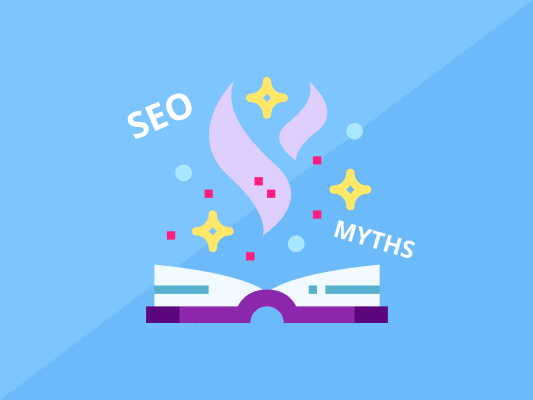Are the SEO myths holding you back? Check out what’s hindering you from ranking well and how to fix them.
There are some SEO myths you need to stop believing before it is too late.
The world of SEO can seem confusing.
That’s because we don’t know how the search engines work; we can only guess.
Unfortunately, that leads to a lot of myths. And if you follow some of these myths, it can have a fatal impact on your rankings.
Here are the 10 SEO myths you should ignore in 2021 and beyond:
- SEO Is Dead
- SEO Is A One-Time Thing
- PPC Ads Can Help You Rank Higher
- Buying Backlinks Will Work
- Speed Isn’t That Important
- Social Media Signals Help You Rank
- Keyword Stuffing is Fine
- Don’t Target Low-Traffic Keywords
- There’s A Penalty For Duplicate Content
- Content Quality Doesn’t Matter – It’s All About Keywords
We will look into each of the SEO myths above and how you can avoid making the same SEO mistakes again
10 SEO Myths You Should Ignore
Let’s start with the most famous SEO myth, SEO is dead.
1. SEO Is Dead
Unbelievable, but it’s true. As years passed by, marketers will still wonder if SEO is still alive.
It is also not surprising because humans are always in search of better ways to improve their business. That includes search visibility.
Or perhaps the question is not whether SEO is dead, but how can you rank faster quickly and get more traffic and conversion?
The thing is, in SEO, the fruits of your labor takes a longer time than paid search. That could be the reason why one might think SEO is dead – when they see no result.
Not to forget, there are over 200 ranking factors, and making sure you’re doing everything right may seem overwhelming.
But in BiQ, it’s the solid SEO strategy that helped us grow and led to a significant ranking boost and more traffic.
The blog post traffic increased after we optimized them.
In fact, there are thousands of examples of similar cases online.
Bottom Line:
There’s no such thing as SEO is dying or SEO is dead.
It’s one of the top SEO myths you MUST ignore because it may prohibit you from moving forward.
2. SEO Is A One-Time Thing
SEO is by no means an I-did-it-once thing. It’s a continuous process, and there are a couple of reasons why that is:
- Constant algorithm updates
- Outdated content
- Competition is moving forward.
Some marketers apply a few strategies, see positive results, and think they don’t need to worry about SEO anymore.
But, what they don’t realize is that they’ll utterly fail.
If you don’t re-evaluate your strategy and adjust it to the newest updates, you risk a huge ranking and traffic drops.
That said, it’s important to track your SEO performance over time. In SEO, it’s about constant experimentation and optimization.
Using BiQ’s Rank Tracking, you can easily link your ranking positions to your SEO efforts and processes. Find out what are the actions that lead to your keyword rankings growth.
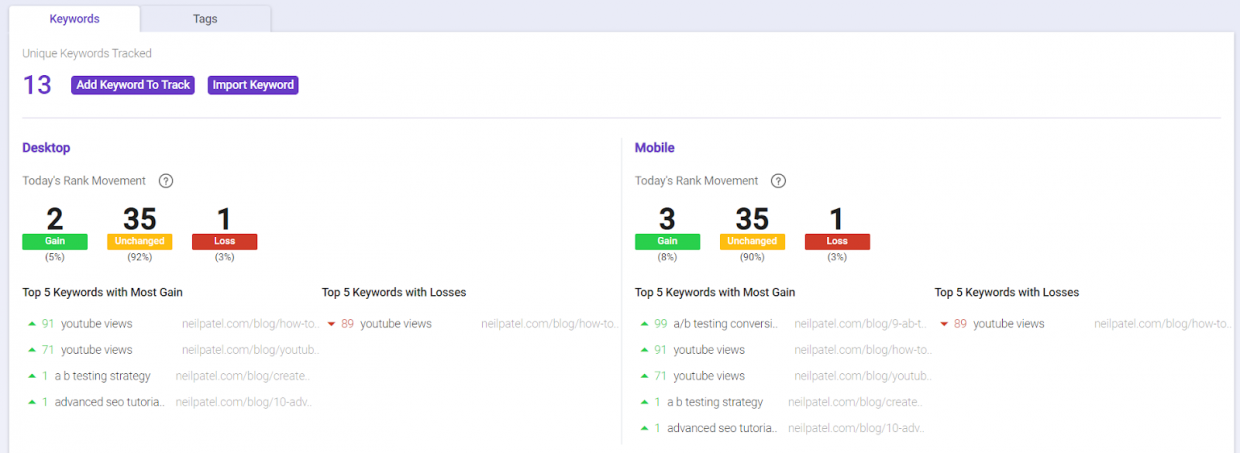
Whether you have just built some backlinks to your website or included target keywords in your post’s title and meta description, BiQ’s rank tracking can help understand the actions that have led to your SEO success.
BiQ allows you to use an advanced tagging system that helps you group your ranking keywords and pages exactly how you want them and not bound by the page URL.
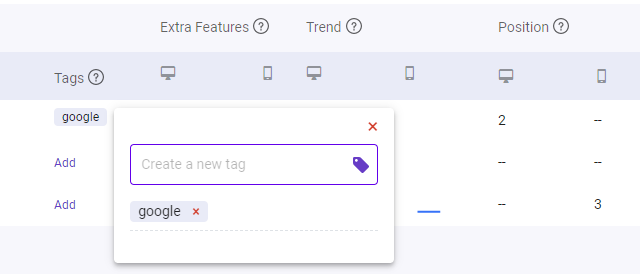
This would give you a bird’ eye view of your ranking data easily, especially when looking for daily or weekly changes.
This is important to understand what works for your website SEO and actionable data on what to avoid so you can quickly recover your lost rankings.
The most important ranking factor is relevance, at least according to SparkToro.
That’s the reason why it is important to make your content updated and relevant to your audience. But, is your old content from 5 years ago still relevant?
Probably not. You either got lucky and found an evergreen topic that doesn’t change at all (1% of topics), or your content is outdated.
Outdated content can give readers false information. Google tries to prevent it, and that’s why updating old content has such an impact on rankings.
Fortunately, you can use BiQ’s Content Intelligence to check your content relevance and identify any critical SEO issues.
The content tool will show you a full analysis of your content. You can see there are three important parts of the analysis.
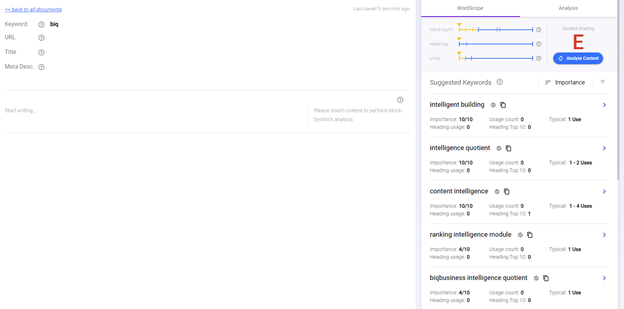
The first section would be the paragraph by paragraph analysis. The paragraph is divided into sections, and you can see their relevancy, sentiment, and readability.
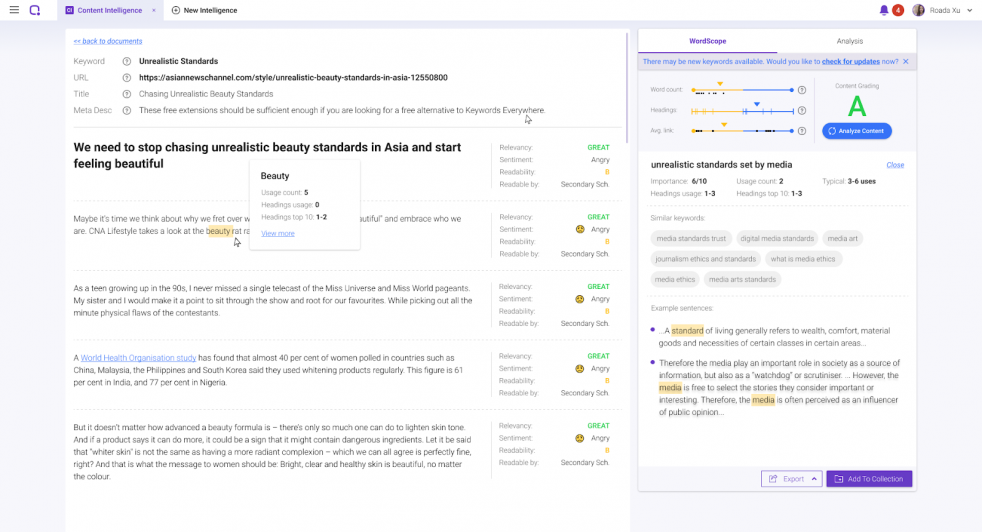
Next, you will see an overview of your content performance, including readability, sentiment distribution, word count, semantic density, and keyword density.
Lastly, you can switch to the analysis tab to check on the WordVector and Fundamental SEO optimization.
WordVector tells you the performance of your content against the Top 10 SERP content.
The best part about this feature is that it can tell you exactly which paragraph has lesser relevance to the overall content.
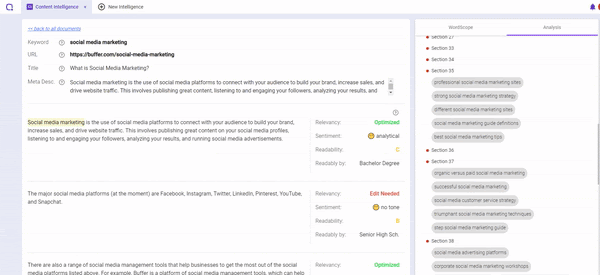
You can then dive deeper into the paragraph and better understand how to improve your target keyword’s relevancy.
On the other hand, the Fundamental section will show you your on-page SEO performance.
They’re a lifesaver if you want a quick insight into how your content is performing. It will unveil all critical SEO errors in your content.
Bottom Line:
SEO is by no means a one-time thing.
It’s a continuous process you must continuously work upon.
3. PPC Ads Can Help You Rank Higher
Here is another common SEO myth – you might hear PPC ads can help you rank higher. But even Google says it’s not true, that it’s a myth.

The snippet above is from Google Ads’ official website, so you can be sure it’s true.
But that doesn’t mean PPC ads can’t help you rank higher indirectly. In fact, Ahrefs used the PPC ad campaign to show up high in Google and build backlinks.
(They spent over $1000 on that)
Here is a snippet from Ahrefs:
The results?
11 new domains were linking to them, and they saw a big ranking boost.
That’s not surprising because the more referring domains link back to your website, the higher the chances you’ll rank.
That doesn’t mean you can turn on any crappy PPC campaign and see the same results. You probably won’t.
It has to be strategic and well-planned.
Bottom Line:
PPC ads won’t help you rank higher in the organic search results, at least not directly.
But, if you can do it right, they can lead to more backlinks, indirectly helping your rankings.
4. Buying Backlinks Will Work
You probably know how important backlinks are. It is one of the most important ranking factors in Google.
But, they are tough to get, especially if you’re just starting.
That’s why many businesses are selling many backlinks for a reasonable price – 20k backlinks for just $10.
You can look at the chart below and be all hyped out about it.

You’ll buy thousands of backlinks and will rank on the first page of Google, right?
You might want to think them over again because buying backlinks can hurt your rankings.
Google is smart and can quickly identify that you bought backlinks. It’ll then penalize you for doing so, and you may never see the light of higher ranking ever again.
When doing backlinking, you should focus more on quality rather than quantity because relevancy is an important ranking factor.
There are better ways to build valuable backlinks you can learn about in our previous post.
Bottom Line:
Buying backlinks is often the quickest way to boost your website authority and page rankings. But it is a risky business, and it is not worth the risk, especially in the long run.
5. Speed Isn’t That Important
This is the most common SEO myth that some may still believe.
Nobody likes waiting for a page to load, and most importantly, we don’t have time for that. We live in a fast-paced era, and if something takes too long to load, we leave.
The longer the site loads, the more visitors you’ll lose.
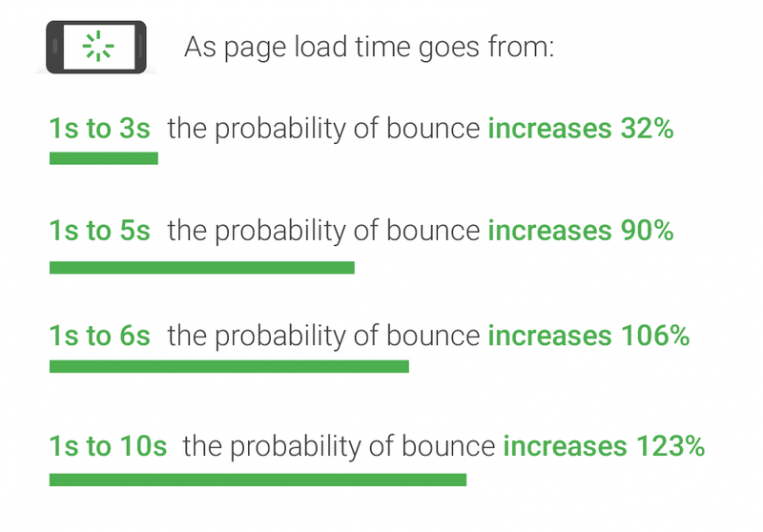
That’s right, a 123% higher chance of bounce rate when a site goes from 1s to 10s. The phrase “Time is money” is very true, especially with the page speed.
Just a one-second delay can cost you a lot of money and potential customers.
Speed is essential for smartphones.
We use smartphones instead of desktop because we don’t want to waste our time waiting for the computer to turn on. We want to have everything immediately, and so we use phones.
There are many ways you can make your mobile load faster. So start improving your mobile speed.
Bottom Line:
Page speed is crucial for getting traffic and sales.
Only a fraction of a second can cost you valuable customers and decrease your conversions.
6. Social Media Signals Help You Rank
Here is another interesting SEO myth…
The more shares you get on social media, the higher you’ll rank, right?
It seems logical to think that way. If your content gets shared a lot, it must be high-quality and valuable, and Google will increase its rankings.
But as it turns out, it’s not a thing.
According to Google’s John Mueller, social signals don’t affect search rankings, at least not directly.
This is a big SEO myth, mostly because Google was continually changing it…
- In 2010, Google said social metrics don’t affect rankings.
- In 2012, Google said that they are trying it.
- In 2015, Google confirmed that it isn’t a thing again.
Social signals aren’t a ranking signal mostly because it’s easy to manipulate them, like buying backlinks.
But figuring out if you did so is a lot more complicated, if not impossible, than with backlinks.
Even though it isn’t a ranking factor, it can still help you build lots of backlinks and get more traffic, leading to higher rankings.
Learn more about social media marketing and how it can help your business in our previous post.
Bottom Line:
Social media signals aren’t a direct ranking factor.
But if you can use social media properly, it can lead to more exposure, higher traffic, and more backlinks, each increasing your rankings.
7. Keyword Stuffing is Fine
According to Google:
“Keyword stuffing” refers to the practice of loading a webpage with keywords or numbers in an attempt to manipulate a site’s ranking in Google search results.
Below is an example of keyword stuffing:

It’s completely unnatural and annoying. Instead, you should try to put keywords naturally throughout the article.
The ideal keyword density is around 1 – 2%. That means you should include a keyword once or twice every 100 words. The most important thing is to use them naturally.
Search engines are smart and can easily detect whether you’re using keyword stuffing.
Bottom Line:
Keyword stuffing is ancient history; nobody should be using it. It won’t help you rank higher. Instead, it will do the opposite and get you penalized.
8. Don’t Target Low-Traffic Keywords
Hear me out… This SEO myth will probably shock you.
You should not target juicy keywords that get millions of searches per month. Instead, you should pick low-traffic keywords that are relevant to your businesses.
In other words, choose long-tail keywords. Long-tail keywords may have low volume, but they are highly converting because they are more intent-focussed.
Trying to rank for the high-traffic keywords is one of the common SEO mistakes. I am guilty of doing that, too (at least at the beginning of my career). It seems like a no brainer to go for the shiny apple on top of the tree.
But that’s not how it should be done. So, where and how do you find these keywords?
Go to BiQ’s Keyword Intelligence and type in the name of the topic you want to write about to the search bar.
Hit enter, and you’ll get a list of related keywords.
After that is time to filter them using Advanced Filter.
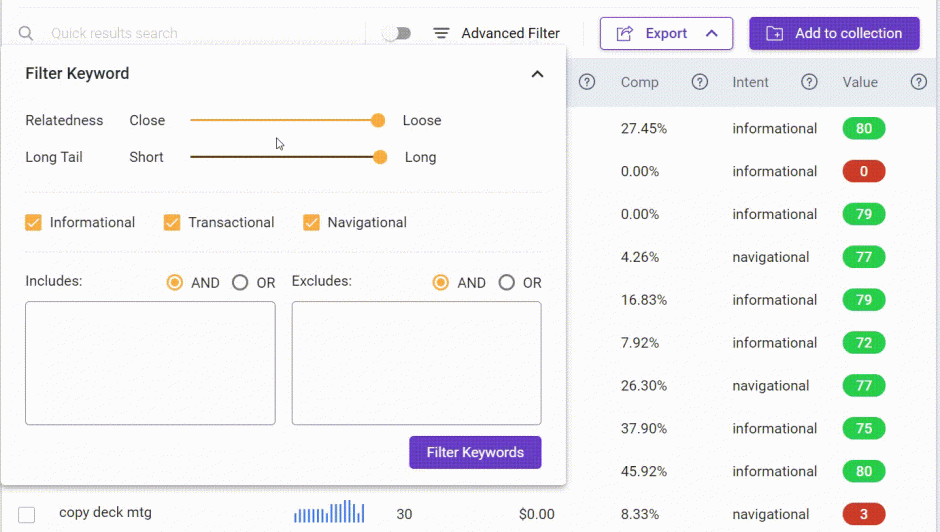
Simply select only closely related, long-tail keywords and choose intent according to the type of your content.
You can then use these keywords in your content to get more traffic and sales.
It’s a paradox.
It’s actually low-traffic keywords that give the most conversion.
Bottom Line:
Choosing high-traffic keywords won’t get you far. In fact, there are many cases where you want to ignore the search volume too.
It’s a much better option to choose low-traffic keywords because they have lower competition and are a lot easier to rank.
9. There’s A Penalty For Duplicate Content
If the same content appears on multiple URLs, you’ve got duplicate content.
Most business owners think they don’t face this issue. But, as it turns out, duplicate content affects 50% of all websites.
But does duplicate content lead to a penalization?
At first glance, it may seem like it. If you look at the chart, there was a big traffic drop as soon as the duplicate content appeared.

Was that really because of the penalty from Google?
The answer is NO.
Duplicate content won’t penalize you. It’ll only make it difficult for Google to rank your page correctly.
Fortunately, fixing it is pretty easy.
You just need to identify the duplicate and pick the original page. This is the page you want to rank for in the search results. You must then need to mark all other webpages as “rel=canonical,” which will tell Google that they are duplicates.
Discover how to fix duplicate content in our post.
Bottom Line:
Duplicate content won’t penalize your website.
However, you’ll probably see a big traffic drop because Google won’t be able to appropriately rank your web page.
10. Content Quality Doesn’t Matter – It’s All About Keywords
Finally, we have come to our last SEO myths.
It doesn’t matter what keywords you use; if you create irrelevant or high-quality content, you won’t rank high nor get traffic.
Your primary focus should be content quality, not the right keywords.
That’s not to say that keywords don’t matter – they do. But quality is more important.
So, you should first create high-quality content and then optimize it for keywords. That’s the best way to get a lot of traffic and rank higher. You can easily do that with BiQ’s Content Intelligence.
Other than checking your content performance, the tool can also guide you in creating optimized content.
Simply enter your target keyword. And you may see something like this:
You can see a breakdown of your keyword in terms of usage, similar keywords, and example sentences on the right side.
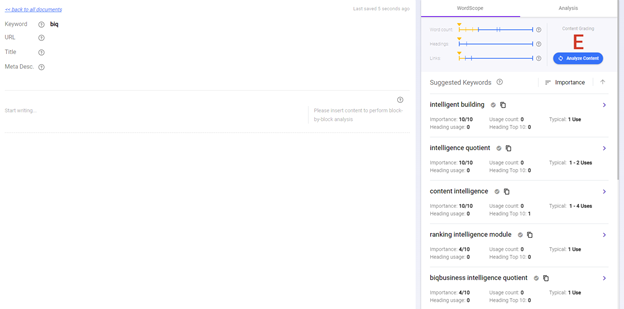
They should be the go-to-source that shapes your article as you write. For example, if you’re writing about “keyword research,” you can get similar keywords like “favorite keyword research tool,” best free keyword research tool,” and so on.
In other words, you can’t hope to satisfy searchers who are looking for keyword research without writing about these similar keywords.
You can also make use of the keywords to craft your outline! Try out the content tool for free by signing up for your free BiQ account now.
SEO Myths: Does SEO really matter?
The truth is, yes. SEO is important as it has always been. Don’t let the SEO myths and mistakes above hold you down from being successful.
They are the SEO myths that can prevent you from ranking higher or even lead to penalties that will diminish traffic.
Are there any SEO myths that I missed out on?
Let me know in the comments below right now.



